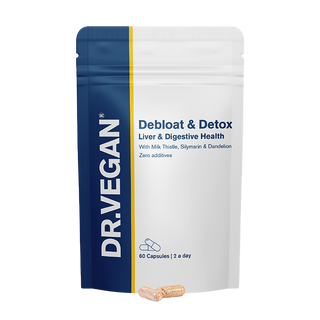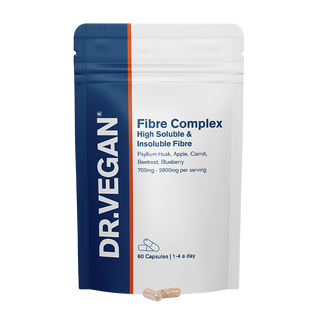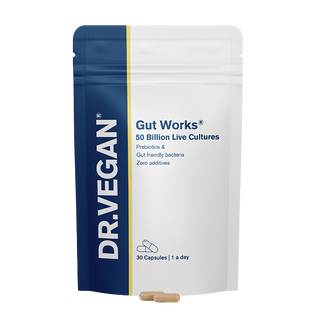Do I need to take a fibre supplement?

As an essential component of a balanced diet, fibre is crucial to maintaining digestive health and overall wellbeing. Yet deficiency in fibre, often referred to as ‘the fibre gap’, is very common. It is estimated that 90% of people do not get enough fibre in their diet and women especially need to increase their fibre intake.
While it's ideal to obtain fibre from a diverse range of foods, there are instances when a fibre supplement becomes a valuable addition to one's routine. In this article, we'll explore the ins and outs of fibre supplements, including when they might be necessary, how to take them effectively and considerations for choosing the best supplement for your needs.
What are fibre supplements?
Fibre supplements are concentrated forms of dietary fibre that aim to supplement the fibre content of your diet. They come in various forms, including powders, capsules and chewable tablets, providing a convenient way to increase your daily fibre intake. Read more in 'Why fibre in your diet is essential' or discover the difference between soluble and insoluble fibre.
When do I need a fibre supplement?
Before incorporating a fibre supplement into your routine, it's crucial to consider whether it is necessary for your circumstances. Here are some common scenarios where a fibre supplement might be beneficial:
- Constipation: If you're experiencing infrequent or difficult bowel movements, a fibre supplement can help soften the stool and promote regularity. Discover 'How to get rid of constipation' and 'What does your poo say about your health?'.
- High cholesterol levels: Certain soluble fibres, such as beta-glucans, can help lower cholesterol levels by binding to cholesterol in the digestive tract.
- Appetite control: Fibre helps you feel complete for extended periods, making it a valuable tool for those seeking to manage weight.
- Blood sugar regulation: Soluble fibre, found in some supplements, can slow down the absorption of sugar, aiding in regulating blood sugar levels.
- Lowering the risk of diverticulitis: Fibre can help prevent diverticulitis, a condition characterised by inflammation or infection of small pouches (diverticula) in the walls of the colon.
How to take fibre supplements
When incorporating a fibre supplement into your routine, consider the following:
- Timing: Taking fibre supplements with a large glass of water is generally recommended. Some prefer taking them in the morning to kickstart the day, while others find evening consumption more convenient.
- Gradual introduction: Introduce fibre supplements gradually to allow your digestive system to adjust, minimising the likelihood of bloating or gas.
- Consistency: To experience the full benefits, take the supplement regularly as directed. Consistency is critical for maintaining digestive regularity.
- Side effects: While fibre supplements are generally well-tolerated, some individuals may experience mild side effects such as bloating or gas. Adjusting the dosage or the type of fibre may alleviate these symptoms.
How long does it take for a fibre supplement to work?
The time it takes for a fibre supplement to produce noticeable effects can vary. Some individuals may experience improvements in bowel regularity within a few days, while others may take longer to adapt. Patience is essential when incorporating fibre supplements into your routine.
When not to take a fibre supplement
Avoid fibre supplements if you have certain medical conditions, such as intestinal blockages or inflammatory bowel diseases, without consulting a healthcare professional. You may be interested in reading the 'Common & unusual symptoms of IBS'.
Debloat & Detox

The best fibre supplements
Consider choosing a comprehensive fibre supplement with a mix of soluble and insoluble fibres, including those from Psyllium Husk, Apple fibre, Carrot fibre, Beetroot fibre and Blueberry fibre, like DR.VEGAN's Fibre Complex, for maximum benefits.
- Psyllium Husk: Psyllium husk is a soluble fibre that absorbs water in the gut, forming a gel-like substance. This helps soften stool and promotes regular bowel movements, making it an effective remedy for constipation. Psyllium has been shown to help lower LDL (low-density lipoprotein) cholesterol levels, contributing to heart health. Discover our expert nutritionist's food guide for a healthy heart.
- Apple fibre: Apple fibre, particularly found in the skin, provides both soluble and insoluble fibre. This aids in maintaining regular bowel movements and preventing constipation. The soluble fibre in apples may help lower blood cholesterol levels, supporting cardiovascular health. You may enjoy reading 'The impact of your gut on your heart'.
- Carrot fibre: Carrot fibre is rich in soluble fibre, which can contribute to a feeling of fullness. This may assist in weight management by reducing overall calorie intake. The insoluble fibre in carrots adds bulk to the stool, promoting healthy digestion and preventing constipation. Learn what your farts say about your health.
- Beetroot fibre: Beetroot fibre can slow down the absorption of glucose in the digestive tract, helping to regulate blood sugar levels. The fibre in beets may contribute to lower blood pressure and improved cardiovascular health.
- Blueberry fibre: Blueberries, including their fibre, are rich in antioxidants, which help combat oxidative stress and inflammation in the body. Blueberry fibre may promote a healthy gut microbiome, contributing to improved digestion and overall gut health. Read 'Why you should improve your gut health'.
Can you take a fibre supplement with probiotics?
Yes, combining fibre supplements with probiotics can benefit overall gut health. Fibre nourishes beneficial bacteria, while probiotics provide live microorganisms that support a balanced gut microbiome. Nutritional therapist, Isabelle Nunn, who was a practising pharmacist for over 10 years, answers the 7 most commonly asked questions about probiotics.
Fibre supplements can be valuable additions to your diet under the right circumstances. Always consult a healthcare professional to determine whether a fibre supplement suits your needs. Fibre supplements can improve digestive health and overall wellbeing with careful consideration and proper use. Alternatively, you can get in touch with the team at DR.VEGAN®, who are always happy to help.
Learn the difference between prebiotics and fibre.
Discover our range of award-winning vegan supplements and probiotics.
You may also enjoy reading:
- What are prebiotics and probiotics?
- Latest gut health customer survey: IBS causes & signs revealed
- Acid reflux? Best 3 foods to eat and avoid
- Best probiotics for IBS
- Common & unusual symptoms of IBS
- Signs of gluten intolerance
- 5 common myths of coeliac disease
- What is period poo?
Want to hear more from our nutritionists? Sign up to our email newsletter for insights and exclusive offers:



















